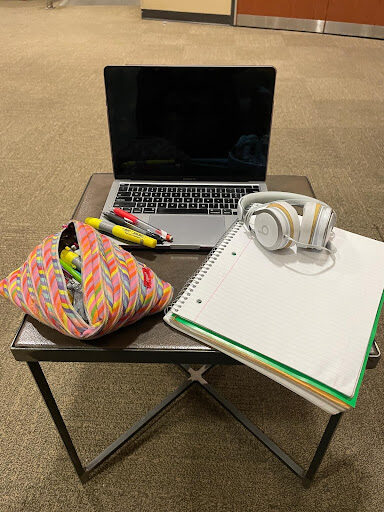The end of the fall semester can create stress and anxiety for students. Associate Professor of Psychology, Dr. Matthew W. Kirkhart, has some tips to help ease stress. Kirkhart says final exams and projects can produce stress and anxiety because of the high-pressure nature of the end of the semester. He also says stress is a natural part of the human experience, but finding a healthy and effective way to manage stress is important to reduce anxiety.
“It’s going to be stressful and there is nothing much you can do about that, but there are things that you can do to prepare yourself to manage stress and weather that storm,” Kirkhart said. “Primarily, stress manifests itself through anxiety and sometimes depression and both of those together can often make it difficult for folks to put forth the effort that they would normally be able to do.”
Kirkhart’s research is centered around learning and memory processes. His research interconnects with the stress students experience around final exams through the process students undergo to relearn and retain information in a short time.
Final exams vary based on one’s schedule, but one tactic for helping to manage stress is to block out your schedule and structure your time. The days leading up to exams can be divided up to maximize study time. Jack Leary ‘23 does this and said it helps him to plan and execute with precision.
“On the study day, I like to label out when all my finals are and label what time I have each day. Section out my time like from 9 a.m. to 12 p.m., study for this, 12 p.m. to 1 p.m. eat something. By blocking out my time, I know what period of the day is dedicated to a certain activity and making sure I stick to that,” Leary said.
Self-care is another way to manage stress throughout finals season. Self-care comes in a variety of forms and is a valuable way for students to ease their stress. Kirkhart recommends continuing to engage with friends to help break up the long hours of studying. He recommends setting aside time for exercise, a hobby, mindfulness meditation, or whatever helps you de-stress.
“Try to schedule in social support. Meet with friends for dinner or whatever. Get away from studying during that time period and enjoy each other,” Kirkhart said.
Professors can be a valuable resource during finals season. Leary encourages students to utilize their past assignments to get insight into what information their exams could cover and to keep the lines of communication open.
Leary said, “I would say communicating with the professor is one of the most important things. Going back over previous exams and looking at the structure of those, and meeting with the professor to see if they are going to give a similar format or if they are planning to throw a curveball and if so what is it going to be. Trying to pick the professor’s brain a little bit because, in the end, they are the ones making it and grading it.”
Distractions can stall progress when it comes to studying for finals, especially phones. Texts and notifications can take students’ focus away from their work and make it difficult to proceed with tasks. Alexis Piasecki ‘26 agrees.
“My biggest problem is my phone. When I study, I have to throw my phone across the room and turn off all of my notifications. I will get a task done and check it after I am done with it, then throw it back across the room,” Piasecki said.
Kirkhart says that once Loyola students leave the walls of Loyola behind and head out into the world, it won’t be the grades that will stay with them. It will be the memories they created from their experiences here at Loyola.
“Ten years after you graduate, that’s what will be with you, not that you got a B on this exam. You won’t even remember that. What you will remember is that class that changed your way of thinking or reading this book changed my life or having this experience in this classroom after doing this project. Those are the things that will carry through.”
Featured Image courtesy of Samantha Jones.


















































































































